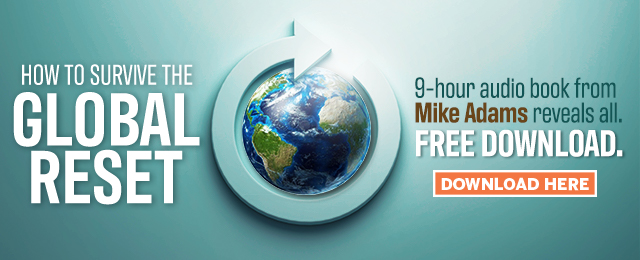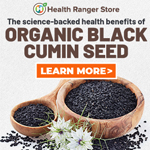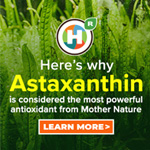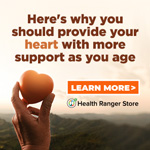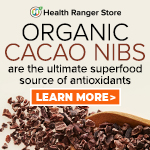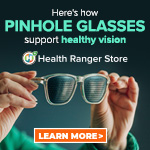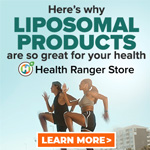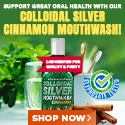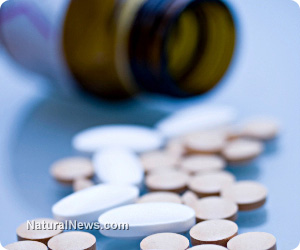
Medications made with caffeine may double risk of stroke
Friday, July 12, 2013 by: Ethan A. Huff, staff writer
Tags: medications, caffeine, stroke risk
- European Court of Justice: Healthcare professionals who promoted or administered COVID-19 vaccines are CRIMINALLY LIABLE for any harm caused
- “Old Man in a Chair”: The COVID-19 pandemic was a carefully orchestrated scheme for global control
- Cinnamon plays a critical role in diabetes management
- Scientists unveil breakthrough method to eliminate "Forever Chemicals" from water, transforming waste into graphene
- FRAUD ALERT: Details DEMOCRATS do NOT want you to know about the $40 BILLION wasted on Fed-loaded credit cards cancelled by DOGE
- Massive egg substitution recall: Bleach contamination sparks nationwide concern
- Newly released JFK files reveal Pentagon's role in creating Lyme disease and covid in the same lab
- Postcard from 1875 highlights smallpox vaccine’s failure: Lessons for today’s COVID-19 response
- DOGE finds evidence of Social Security fraud and illegal immigrant voter registration
- AI-powered forecasting model proves more accurate than traditional systems at predicting the weather
- Zelensky defies Trump, rejects U.S. aid repayment and mineral deal amid rising tensions
- World Health Organization in crisis, prepares for DOWNSIZING after U.S. withdrawal and funding problems
- Preparing for the unthinkable with William Brocius’ “How to Survive the Death of the Dollar”
- Trump administration deploys spy satellites to enhance southern border surveillance
- Oncologist warns of ‘terrifyingly aggressive’ cancers in children, linked to immune suppression from COVID vaccines
- Pentagon memo suggests U.S. will not defend Europe from Russian aggression, prioritizing China and homeland security
- Science proves PASSION FRUIT is a powerful medicine for the GUT and the HEART
- Israel's war on Gaza's healthcare: Over 1,400 medical workers killed in attacks
- Newly released JFK files reveal Pentagon's role in creating Lyme disease and covid in the same lab
- Kiss Your Genetic Privacy Good-Bye! 23andMe Gets Green Light to Sell Your Intimate Genetic Details to Anyone They Want
- Oncologist warns of ‘terrifyingly aggressive’ cancers in children, linked to immune suppression from COVID vaccines
- Analysis: The coming economic collapse, a mass uprising and Trump's three secret weapons to halt the growing revolt
- European Court of Justice: Healthcare professionals who promoted or administered COVID-19 vaccines are CRIMINALLY LIABLE for any harm caused
- Dr. Suzanne Humphries makes bombshell appearance on Joe Rogan podcast, exposing vaccine industry deception back to POLIOMYELITIS
- Woman contracts WORLD'S DEADLIEST VIRUS after unknowingly being given the WRONG VACCINE
- NIH study, buried for decades, reveals that Flu Shots INCREASE elderly deaths, not prevent them
- Sugar-free deception: Artificial sweeteners hijack hunger signals, fuel obesity epidemic, study warns
- CDC finally halts $11 billion COVID funding scam as health officials admit the ‘pandemic’ was a fraud
- AI weather model outperforms traditional forecasts, boosts accuracy by 20%
- Black cumin seed oil emerges as a powerful ally against breast cancer and chronic inflammation
- Musk targets “strangely wealthy” lawmakers in DOGE probe, names Pelosi, McConnell, Schumer
- COVID-19 scandal linked to CANCER SURGE: Billionaire researcher sounds alarm
- “Independent” anti-Russia outlet MEDUZA faces COLLAPSE as US funding dries up
- The Health Ranger releases “Vaccine Zombie” song and music video, using AI-animated zombies for the music video
- DARPA: The shadowy innovator behind the world’s most advanced military technologies
- Britain’s descent into police state censorship: Parents raided for questioning their daughter’s school system online
- Newly released JFK files reveal Pentagon's role in creating Lyme disease and covid in the same lab
- California's social media censorship law struck down: A victory for free speech or a threat to online safety?
- EPA advisor admits the agency is funneling billions to climate groups ahead of Trump’s return to White House
- The Health Ranger releases “Vaccine Zombie” song and music video, using AI-animated zombies for the music video
- Dr. Mike Yeadon releases 15-minute testimony - WATCH - about genocidal intent of COVID “vaccines”
- Florida takes a stand: DeSantis proposes permanent ban on mRNA vaccine mandates
- Mike Adams releases country western hit single: Goin’ Back in Time is Comin’ Home
- Rep. Nancy Mace introduces bill to ban biological males from female facilities on federal property
- Unpacking the Lies That We’ve Been Fed – new song and music video released by Mike Adams, the Health Ranger
- “Why we influenced the 2020 elections”: Facebook files reveal the coordinated effort to bury the Hunter Biden laptop story
- House Intelligence Committee calls for the ARREST and PROSECUTION of Dr. Anthony Fauci
- Sugarcane extract superior to cholesterol-lowering drugs?
- The pandemic as a tool for INDOCTRINATION: Understanding “The Indoctrinated Brain” by Dr. Michael Nehls
- Survival 101: Effective EMF blocking techniques
- Mike Adams releases music poetry sensation: A Child of God
- Peter Rost exposes Big Pharma corruption in his book “The Whistleblower: Confessions of a Healthcare Hitman”
- Migrants are taking advantage of recent hurricanes to scam residents and loot their homes
- Michigan sheriff announces criminal investigation into 2020 election crimes, Dominion Voting Systems
- Red Cross issues warning to stop blood plasma donations from vaccinated people
- Scientists confirm: GENIUS brain function can be spontaneously unleashed in humans without any apparent cause
- EPA advisor admits the agency is funneling billions to climate groups ahead of Trump’s return to White House
- HYSSOP: What research reveals about the health benefits of this ancient holy herb
- Two containers with completed ballots fall out of truck in Florida
- Fully vaccinated about to see “tsunami” of illness and death, warns virologist
- Global leaders unite to clamp down on “misinformation” with UN-backed Cascais Declaration
- BREAKING: 2025 NDAA authorizes mandatory military draft of WOMEN across America… as Pentagon pursues global NUCLEAR war with both Russia and China at the same time
- Michael Yon warns of a ZIONIST TAKEOVER in Trump’s second administration
- Ozempic and Wegovy weight loss drugs are injectable LIZARD VENOM PEPTIDES that may unleash a devastating wave of organ failure… side effects align with symptoms of SNAKE BITES
- BOMBSHELL: DNA testing kits are a SCAM to develop ethnic-specific bioweapons
- Israeli soldiers accused of even more torture and abuse in the West Bank
- These 13 countries just signed an agreement to engineer a global FAMINE by destroying food supply
- NASA admits that climate change occurs because of changes in Earth’s solar orbit, and NOT because of SUVs and fossil fuels
- Newly released JFK files reveal Pentagon's role in creating Lyme disease and covid in the same lab
- RFK Jr. clears key hurdle: Sen. Susan Collins backs controversial HHS nominee, signaling a new era for health policy
- Sermon 30: How Jesus reveals Caesar’s FAKE CURRENCY and FALSE AUTHORITY
- Coriander seeds: Ancient medicine backed by modern science
Published in the journal Stroke, the new study compared 940 adult patients who had suffered a hemorrhagic stroke to other patients who had not suffered a stroke but had been hospitalized. A third group of people who had neither suffered a stroke nor been hospitalized was also included as part of the analysis.
After interviewing the participants from each group about the medications they had taken two weeks prior, the study team determined that, overall, those who had taken a medication containing caffeine were about 250 percent more likely to suffer a stroke than those who had not taken a medication containing caffeine.
This percentage rang true even after accounting for those who drank tea, coffee, and other beverages that contain caffeine, which suggests that the caffeine-containing drugs themselves possess some uniquely inherent danger. Further evidence proving this was made plain by the fact that those who did not drink any caffeine-containing beverages were up the 300 percent more likely than all others to suffer a stroke.
"Even though caffeine-containing medicines appear to increase the risk of hemorrhagic stroke, it doesn't appear to be the 'caffeine' dose" that is responsible, said Dr. Daniel Woo, an associate professor of neurology at the University of Cincinnati in Ohio, to reporters. Dr. Woo was not involved in the study. "Folks who drank three cups of coffee per day didn't seem to have a higher risk of hemorrhagic stroke."
Caffeine isn't the problem; it's the drugs
So why the major disparity in health effects between caffeine-containing drugs and caffeine-containing beverages? Researchers are not entirely sure, although they do suspect that other active compounds in the drugs are to blame. Naturally-occurring caffeine in food, after all, is a far cry from the synthetically-added caffeine injected into pharmaceutical drugs, which already come with deadly side effects.According to Dr. Woo, many of the drugs that contain caffeine, which include cold medicines, pain relievers, and so-called "wake-up" pills, contain other active components that are believed to increase stroke risk. Combined with caffeine, these components could become synergistically more threatening to health.
"Moderate consumption of coffee (1-3 cups per day), which is the main source of caffeine in most populations, has been associated with lower risk of all types of stroke," says Dr. Susanna Larsson, a nutritional epidemiologist from the National Institute of Environmental Medicine at the Karolinska Institute in Stockholm, Sweden, noting that caffeine does not appear to be the primary issue.
So the takeaway from this study is that it is probably best to avoid pharmaceutical drugs that contain added caffeine. While their precise mechanism of harm is still largely unknown, caffeine-containing drugs generally do not appear to be safe for human consumption.
Sources for this article include:
http://www.reuters.com
http://www.peoplespharmacy.com
http://www.chicagotribune.com
Medications at FETCH.news
Get independent news alerts on natural cures, food lab tests, cannabis medicine, science, robotics, drones, privacy and more.
Take Action: Support Natural News by linking to this article from your website
Permalink to this article:
Embed article link: (copy HTML code below):
Reprinting this article:
Non-commercial use OK, cite NaturalNews.com with clickable link.
Follow Natural News on Facebook, Twitter, Google Plus, and Pinterest
Science News & Studies
Medicine News and Information
Food News & Studies
Health News & Studies
Herbs News & Information
Pollution News & Studies
Cancer News & Studies
Climate News & Studies
Survival News & Information
Gear News & Information
News covering technology, stocks, hackers, and more



"Big Tech and mainstream media are constantly trying to silence the independent voices that dare to bring you the truth about toxic food ingredients, dangerous medications and the failed, fraudulent science of the profit-driven medical establishment.
Email is one of the best ways to make sure you stay informed, without the censorship of the tech giants (Google, Apple, Facebook, Twitter, YouTube, etc.). Stay informed and you'll even likely learn information that may help save your own life."
–The Health Ranger, Mike Adams












